-
1. Exam (elaborations) - Test bank for davis advantage for townsend’s essentials of psychiatric mental healt...
-
2. Exam (elaborations) - Test bank for comprehensive radiographic pathology, 7th edition by eisenberg, all cha...
-
3. Exam (elaborations) - Test bank for calculating drug dosages a patient-safe approach to nursing and math 2n...
-
4. Exam (elaborations) - Test bank for calculating drug dosages a patient-safe approach to nursing and math 2n...
-
5. Exam (elaborations) - Test bank for advanced health assessment and diagnostic reasoning, 4th edition by jac...
-
6. Exam (elaborations) - Test bank for potter and perry's canadian fundamentals of nursing, 7th edition by bar...
-
7. Exam (elaborations) - Clinical reasoning cases in nursing 8th edition, 2024 test bank by mariann m. harding...
-
8. Exam (elaborations) - Solution manual for data analytics for accounting, 3rd edition by vernon richardson, ...
-
9. Exam (elaborations) - Solution manual for data analytics for accounting, 3rd edition by vernon richardson, ...
-
10. Exam (elaborations) - Solution manual for data analytics for accounting, 3rd edition by vernon richardson, ...
-
11. Exam (elaborations) - Solution manual for data analytics for accounting, 3rd edition by vernon richardson, ...
-
12. Exam (elaborations) - Solution manual for auditing and assurance services, 9th edition by timothy louwers, ...
-
13. Exam (elaborations) - Solution manual for accounting 28th edition by carl s. warren, christine jonick| veri...
-
14. Exam (elaborations) - Auditing and assurance services, 9th edition test bank by timothy louwers, penelope b...
-
15. Exam (elaborations) - Test bank - biological science, 6th edition by scott freeman chapter 1 - 54 |newest v...
-
16. Exam (elaborations) - Test bank for comprehensive radiographic pathology, 7th edition by eisenberg, all cha...
-
17. Exam (elaborations) - Test bank for current medical diagnosis and treatment 2023, 62nd edition by maxine pa...
-
18. Exam (elaborations) - Test bank for advanced assessment interpreting findings and formulating differential ...
-
19. Exam (elaborations) - Test bank for advanced financial accounting 13th edition by theodore christensen | co...
-
20. Exam (elaborations) - Test bank for burns and groves the practice of nursing research 9th edition by gray, ...
-
21. Exam (elaborations) - Test bank - clayton’s basic pharmacology for nurses 19th edition michelle willihnga...
-
22. Exam (elaborations) - Test bank for davis advantage for pathophysiology introductory concepts and clinical ...
-
23. Exam (elaborations) - Dynamic business law: the essentials, 5th edition solution manual by kubasek, browne,...
-
24. Exam (elaborations) - Dynamic business law: the essentials, 5th edition solution manual by kubasek, browne,...
-
25. Exam (elaborations) - Dynamic business law: the essentials, 5th edition solution manual by kubasek, browne,...
-
26. Exam (elaborations) - Solution manual for accounting what the numbers mean, 13th edition by david marshall ...
-
27. Exam (elaborations) - Clinical reasoning cases in nursing 8th edition, 2024 test bank by mariann m. harding...
-
28. Exam (elaborations) - Clinical reasoning cases in nursing 8th edition, 2024 test bank by mariann m. harding...
-
29. Exam (elaborations) - Test bank for advanced health assessment and diagnostic reasoning, 4th edition by jac...
-
30. Exam (elaborations) - Test bank for calculating drug dosages a patient-safe approach to nursing and math 2n...
-
31. Exam (elaborations) - Test bank for comprehensive radiographic pathology, 7th edition by eisenberg, all cha...
-
32. Exam (elaborations) - Ati comprehensive exit exam (version 1, 2, 3, 4) with 180 ngn questions and revised c...
-
33. Exam (elaborations) - Water treatment operator certification study guide 2024 actual questions and answers ...
-
Show more




